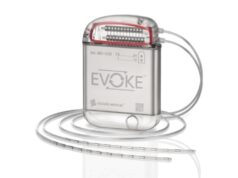
St Jude Medical, Inc. has announced that it has exercised the company’s exclusive option to acquire Spinal Modulation, Inc., developer of the Axium Neurostimulator System. Following the completion of this acquisition, St Jude Medical will become the only medical device manufacturer to offer radiofrequency ablation (RFA), spinal cord stimulation (SCS) and dorsal root ganglion (DRG) stimulation therapy solutions for the treatment of chronic pain.
Once complete, the acquisition of Spinal Modulation will further support St Jude Medical’s mission to help physicians tailor treatment to a patient’s chronic pain condition to achieve superior outcomes. Stimulation of the dorsal root ganglion (DRG) with the Axium system has been shown to provide meaningful relief for patients battling chronic pain, and is especially useful for treating focal pain areas often challenging to treat using traditional spinal cord stimulation (SCS).
The Axium system originally received CE mark approval in November 2011 for the management of chronic, intractable pain. In December 2014, Spinal Modulation announced that enrolment in its ACCURATE US IDE trial had been completed. Spinal Modulation subsequently submitted its PMA application to the FDA in support of marketing approval in the United States. Results from the ACCURATE study will be presented at the 12th annual International Neuromodulation Society (INS) Congress, to be held in Montreal, Quebec, Canada, June 6-11, 2015.
“Physicians need a range of options to effectively treat chronic pain, and our acquisition of Spinal Modulation is part of our ongoing commitment to providing physicians new and innovative therapy options,” said Michael T Rousseau, chief operating officer of St Jude Medical. “Dorsal root ganglion stimulation with the Axium system is highly complementary to our current chronic pain product portfolio, and acquiring this technology will further our ability to partner with physicians to reduce the burden of chronic pain.”
Chronic pain affects approximately 1.5 billion people worldwide, more than heart disease, cancer and diabetes combined. The condition can dramatically affect quality of life, negatively impacting personal relationships, work productivity and daily routines. SCS and DRG stimulation have both been proven to offer patients relief from chronic pain while restoring lost quality of life.
DRG stimulation works differently than traditional SCS, targeting nerves within the DRG, a structure packed with sensory nerves that transmit information to the spinal cord, which then conducts those signals to the brain. Traditional SCS takes a different approach, targeting nerves along the spinal cord’s dorsal column which often proves challenging to isolate the desired target painful area.
By targeting the DRG, stimulation with the Axium system has been shown to be effective in treating conditions currently underserved by traditional SCS, such as chronic intractable pain in the leg, foot and groin. Research has also shown DRG stimulation can benefit patients suffering post-surgical pain and neuropathic pain. This underserved population is estimated to represent more than five times the current addressable market.
“St Jude Medical has a legacy of bringing new, innovative therapy options to patients suffering from chronic pain, and we believe adding DRG stimulation to their chronic pain portfolio will have a number of benefits to patients worldwide,” said David Wood, president and chief executive officer of Spinal Modulation. “We’re proud of what the Spinal Modulation team has built over the past 10 years, and see great potential for St Jude Medical to continue expanding access to DRG stimulation therapy for patients who may benefit from additional therapeutic options.”
Transaction Details
In June 2013, St Jude Medical entered into a series of agreements under which the company made a US$40 million equity investment in Spinal Modulation. In addition to providing St Jude Medical with an exclusive option to distribute the Axium Neurostimulator System in international markets where the technology is approved for sale, the agreements also provided St Jude Medical with an exclusive option to acquire the company. Having exercised its exclusive option, St Jude Medical expects to complete the acquisition of Spinal Modulation in the second quarter of 2015, subject to customary closing conditions.
St Jude Medical will make a payment of approximately US$175 million upon closing with additional payments due upon FDA approval of the Axium system and achievement of certain revenue targets.
According to a press release from St Jude Medical, “Excluding acquisition-related expenses, we estimate that this acquisition will be approximately US$0.05 dilutive to our adjusted consolidated earnings per share for the remainder of 2015, which we expect to partially offset with operating efficiencies. St Jude Medical will provide an update to its adjusted 2015 earnings per share guidance on its first quarter earnings call scheduled to be held on 22 April, 2015.”









